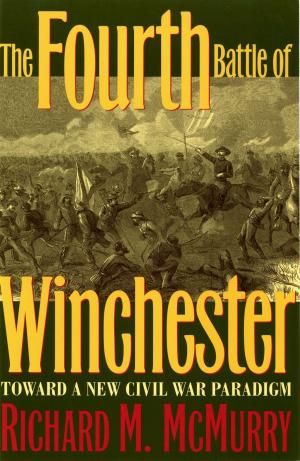Meade
The Price of Command, 1863-1865
Nonfiction, History, Americas, United States, Civil War Period (1850-1877)| Author: | John G. Selby | ISBN: | 9781631013270 |
| Publisher: | The Kent State University Press | Publication: | October 16, 2018 |
| Imprint: | The Kent State University Press | Language: | English |
| Author: | John G. Selby |
| ISBN: | 9781631013270 |
| Publisher: | The Kent State University Press |
| Publication: | October 16, 2018 |
| Imprint: | The Kent State University Press |
| Language: | English |
George Gordon Meade has not been treated kindly by history. Victorious at Gettysburg, the biggest battle of the American Civil War, Meade was the longest-serving commander of the Army of the Potomac, leading his army through the brutal Overland Campaign and on to the surrender of Robert E. Lee and the Army of Northern Virginia at Appomattox. Serving alongside his new superior, Ulysses S. Grant, in the last year of the war, his role has been overshadowed by the popular Grant. This first full-length study of Meade's two-year tenure as commander of the Army of the Potomac brings him out of Grant's shadow and into focus as one of the top three Union generals of the war.
John G. Selby portrays a general bestride a large army he could manage well and a treacherous political environment he neither fully understood nor cared to engage. Meade's time as commander began on a high note with the victory at Gettysburg, but when he failed to fight Lee's retreating army that July and into the fall of 1863, the political knives came out. Meade spent the winter of 1863-64 struggling to retain his job while the Joint Committee on the Conduct of the War sought to have him dismissed. Meade offered to resign, but Grant told him to keep his job. Together, they managed the Overland Campaign and the initial attacks on Petersburg and Richmond in 1864.
By basing his study on the Official Records of the War of the Rebellion, original Meade letters, and the letters, diaries, journals, and reminiscences of contemporaries, Selby demonstrates that Meade was a much more active, thoughtful, and enterprising commander than has been assumed. This sensitive and reflective man accepted a position that was as political as it was military, despite knowing that the political dimensions of the job might ultimately destroy what he valued the most, his reputation.
George Gordon Meade has not been treated kindly by history. Victorious at Gettysburg, the biggest battle of the American Civil War, Meade was the longest-serving commander of the Army of the Potomac, leading his army through the brutal Overland Campaign and on to the surrender of Robert E. Lee and the Army of Northern Virginia at Appomattox. Serving alongside his new superior, Ulysses S. Grant, in the last year of the war, his role has been overshadowed by the popular Grant. This first full-length study of Meade's two-year tenure as commander of the Army of the Potomac brings him out of Grant's shadow and into focus as one of the top three Union generals of the war.
John G. Selby portrays a general bestride a large army he could manage well and a treacherous political environment he neither fully understood nor cared to engage. Meade's time as commander began on a high note with the victory at Gettysburg, but when he failed to fight Lee's retreating army that July and into the fall of 1863, the political knives came out. Meade spent the winter of 1863-64 struggling to retain his job while the Joint Committee on the Conduct of the War sought to have him dismissed. Meade offered to resign, but Grant told him to keep his job. Together, they managed the Overland Campaign and the initial attacks on Petersburg and Richmond in 1864.
By basing his study on the Official Records of the War of the Rebellion, original Meade letters, and the letters, diaries, journals, and reminiscences of contemporaries, Selby demonstrates that Meade was a much more active, thoughtful, and enterprising commander than has been assumed. This sensitive and reflective man accepted a position that was as political as it was military, despite knowing that the political dimensions of the job might ultimately destroy what he valued the most, his reputation.















